22 Strategies to Help Students Who Respond Inappropriately to Others Obtaining Success or Praise

Are you looking for strategies to help students who respond inappropriately when others receive success or praise? If so, keep reading.
1. Make sure to help the learner achieve a level of success in a learning experience so they will do well and receive praise or attention.
2. Make sure that the learner is designated a role in a learning experience in which they can be successful as a participant and enjoy the learning experience (e.g., banker in MONOPOLY®, scorekeeper in a game, teacher assistant, notetaker in discussions, etc.).
3. Make sure that some attention is given to the learner when others do well or receive praise or attention. As they show appropriate behavior when others do well or receive praise or attention, slowly lessen the attention given to the learner.
4. Provide praise or attention as privately as possible to lessen the likelihood of upsetting any students in the classroom.
5. Minimize the emphasis on competition. Urge and reinforce participation, teamwork, excellent sportsmanship, personal improvement, etc.
6. Praise the learner for behaving properly when others receive praise. As the learner demonstrates success, slowly lessen the amount of reinforcement.
7. Make sure that the learner succeeds or receives attention often enough to create a balance with those times when other students succeed or receive praise or attention.
8. Make sure that the teacher is an excellent role model by participating in games, demonstrating excellent sportsmanship, complimenting others, etc.
9. Create rules and go over them at the beginning of a learning experience to lessen the likelihood of misinterpretation.
10. Urge the learner to leave situations that may cause them to become upset, angry, embarrassed, etc.
11. Urge an atmosphere of students helping one another, congratulating each other, discovering something about each other to compliment, etc.
12. Get the learner to take part in learning activities with students who are appropriate models for behavior when others do well or receive praise or attention.
13. If the learner becomes frustrated or upset by the task or learning experience, remove them from the situation, stop the learning experience, or give an alternative learning experience.
14. Make sure that the learner knows that a failure to behave properly during a game or learning experience will result in the termination of the learning experience.
15. Be sure to give close supervision of the learner in tasks and learning activities to intervene early and give problem-solving alternatives should unacceptable behaviors happen.
16. Help the learner find learning activities (e.g., reading, creating, peer tutoring, etc.) in which they can achieve personal satisfaction and success.
17. Do not require the learner to take part in games and learning activities that may be menacing or cause them to demonstrate unacceptable behavior.
18. Make sure the learner does not participate in learning activities with another learner(s) who is likely to encourage unacceptable behavior.
19. Give the learner several learning activities throughout the day in which they can do well and receive praise and attention.
20. Become aware of the learner’s strengths and limitations. Get the learner to take part in learning activities in which they will succeed rather than fail.
21. Consider using an adaptive behavior management app. Click here to view a list of apps that we recommend.
22. Click here to learn about six bonus strategies for challenging problem behaviors and mastering classroom management.






